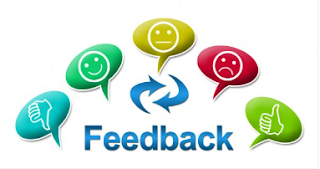How to use feedback constructively
How to use feedback constructively

The
Feedback Matrix is a tool that encourages you to examine both the positive and
negative aspects of feedback. It challenges you to connect the feedback with
what you already know about yourself and with what you did not know and should
explore more fully.
Responses to feedback
Have you
ever observed how people around you respond or react to the feedback they
receive? Usually, these responses are:
- They
accept the negative part of the feedback but try to excuse themselves or blame
others for the problem.
- They
focus on the positive part and use it to reinforce what they already knew to be
true. This reaction can sometimes be because they show resistance to change.
- If the
feedback is negative, they decide that the person giving the feedback is wrong
and discard the comments completely. These people can be prone to arrogance.
- If the
feedback is completely positive, they assume that the person giving the
feedback is polite, and cannot accept that the praise is real and deserved.
This can indicate a lack of self-confidence.
In each
case, these types of responses indicate that the feedback is unlikely to
achieve the desired result. Instead of trying to understand how their behaviour
or performance should change, or what they can do to make even more of their
strengths, people continue to do what they were doing before, without making
any major adjustments or corrections.
Using the Feedback Matrix
The
Feedback Matrix is a tool to overcome your emotional responses to feedback. So
you can apply the feedback and make positive changes in your performance or
behaviour.
It has four quadrants that feedback usually falls into: Positive / Expected, Negative / Expected, Positive / Unexpected, and Negative / Unexpected. Most opinions fall into one of these categories as shown below:
|
|
POSITIVE |
NEGATIVE |
|
EXPECTED |
CELEBRATE
IT |
ACT ON IT |
|
UNEXPECTED |
HABITUATE
IT |
EXPLORE
IT |
·
Positive / Expected
We often have a good idea of what we do well
because we tend to get positive feedback on these things regularly. But instead
of just listening to this kind of praise and doing nothing with it, ask
yourself: How can I celebrate this aspect of myself? How can I use this skill
to increase my productivity or job satisfaction? How can I use this skill to
help others who are not as strong in this area?
·
Negative / expected
If we are honest with ourselves, we are often aware of some of the areas
in our work that need improvement. If our boss asks for a meeting, we will most
likely know and expect what will be discussed. In fact, we are often more
critical of ourselves than others, but we simply don't know how to improve
without some help. To apply this expected feedback and make a positive change,
ask yourself: What actions have I taken to address this concern? How successful
were those actions? What else do I need to examine and/or change to achieve the
results I want? If I don't make these changes, how will this affect my work or
my life?
·
Positive / Unexpected
Receiving positive
feedback that we didn't expect is like a surprise birthday gift. It gives us a
wonderful feeling when we learn something positive about ourselves that was
completely unexpected. But after the initial joy, it is important to examine
this feedback more by asking yourself: Why was I surprised to hear this? What
previous experiences would have made me forget or reject this strength or
skill? How will I celebrate this newly discovered skill? How can I use this
skill to improve my life?
·
Negative / unexpected
This feedback is the most difficult to hear and understand. But it can
also be the source of much self-discovery if we are open to it. Unexpected
feedback often comes from areas we don't want to recognise or are not prepared
to deal with, and can make us defensive. However, when we learn to deal with
it, we can take great strides forward on our path to self-improvement.
When you give or receive feedback,
use it to improve your experience
and your results.




Comentarios
Publicar un comentario